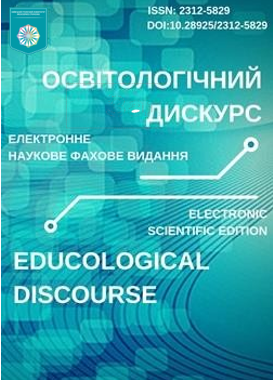Peculiarities of the Application of Information and Communication Technologies for Distance Learning of the Canadian Border Guard Service Personnel
DOI:
https://doi.org/10.28925/2312-5829.2024.12Keywords:
Canada Border Services Agency, distance education, distance learning, information and communication technologies, online technologies, personnelAbstract
The paper reveals the peculiarities of the development of distance education in Canadian educational institutions. The specifics of distance learning in the most popular land-based and virtual universities in different provinces of Canada are highlighted. The main tasks of distance education in the Canadian higher education system are identified. The key problems that hinder the development of distance education at the international level are identified. It is proved that distance learning in Canada is successfully integrated into the educational process and is aimed at training highly qualified specialists in various fields. It is known that due to changes in security legislation in 2001, the practice of visiting different checkpoints was cancelled. It is proved that Second Life is an online world in which users (residents) create avatars and interact with other participants, places or objects. It was noted that a virtual border crossing point was created using Second Life to train cadets to conduct interviews with people crossing the border at checkpoints to Canada. It has been researched that in order to enroll in distance learning and continuing education courses, certain requirements must be met. It is indicated that distance education offers hundreds of courses available on a monthly or semester basis. The article describes the distance learning course "Border Services" on the website, which is divided into two parts. It is known that the first part of the course is designed to provide students with an understanding of the activities and functions of the Canada Border Services Agency and the second one is to provide students with an understanding of Canadian citizenship and immigration.
Downloads
References
Gresham, James, & Ambasz, Diego. 2019. Ukraine – Resume Flagship Report: Overview (English). Washington, D.C.: World Bank Group. http://documents.worldbank.org/curated/en/360951568662377063/Overview
Hudson K. (2009). Border Simulation – Student learning in a virtual world at Loyalist College. Retrieved from https://teachonline.ca/sites/default/files/pdf/innovation-practices/ border_simulation_-_student_learning_in_a_virtual_world_at_loyalist_college.pdf
Hudson, K. & Degast-Kennedy, K. (2009). Pedagogy, education and innovation in 3-D virtual worlds. Journal of Virtual Worlds Research, 2 (1). http://journals.tdl.org/jvwr/article/view/374/449
Loyalist College. Course Details “Border Services”. https://www.loyalistbanner.com/PROD/cewkcrss.P_CrseDetails?subj_code=CUST&crse_numb=8000&sess_code=6.
Loyalist College. Course Details “Border Services”. https://www.loyalistbanner.com/PROD/cewkcrss.P_DistanceEducation.
Novolokova N. P. (2012). Entsyklopediia pedahohichnykh tekhnolohii ta innovatsii. Kh. : Osnova.
Published
How to Cite
Issue
Section
License
Copyright (c) 2024 Educological discourse

This work is licensed under a Creative Commons Attribution-NonCommercial 4.0 International License.
Автори зберігають за собою всі авторські права та одночасно надають журналу право першої публікації на умовах лізенції Creative Commons Attribution-NonCommercial-ShareAlike 3.0 Unported License, що дозволяє розповсюджувати даний матеріал із зазначенням авторства та первинної публікації в даному журналі.





















